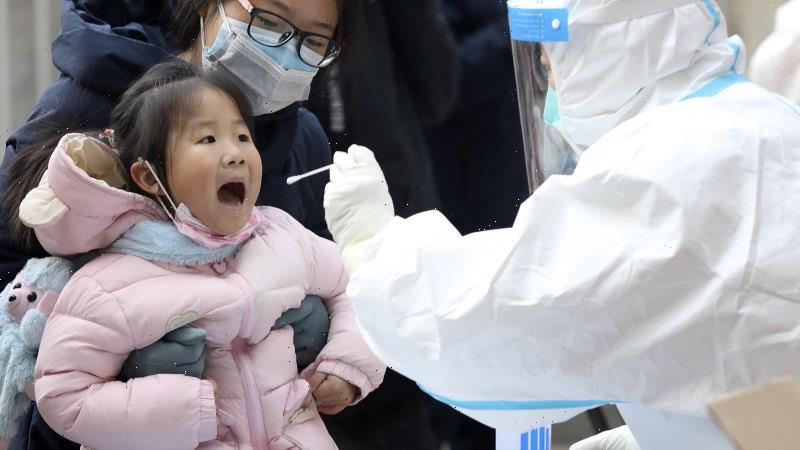
Chinese province neighbouring Beijing expands COVID lockdown
August 28, 2022Another city near Beijing imposed a partial lockdown as COVID-19 infections climbed, taking extra precautions even as cases nationwide continued to ease.
Shijiazhuang, the provincial capital of China’s Hebei province that borders Beijing, said mass testing will be done on residents in four major downtown districts and they are required to stay at home for three days from 2pm on Sunday. It reported 25 local COVID cases for Saturday.
A worker in a protective suit takes a swab from a child for a coronavirus test in Shijiazhuang in China’s Hebei Province last year. Credit:AP
Separately, the northern port city Tianjin, which is close to Beijing, will conduct city-wide mass COVID tests on Monday, according to the state television. Tianjin reported 16 local Covid cases by 4pm on Sunday.
Beijing reported three local COVID cases for Saturday, among 1294 cases for all of China.
The partial lockdown in Shijiazhuang, with a population of 11.2 million people, followed curbs adopted in other areas in Hebei province. Zhuozhou city that borders Beijing imposed a lockdown since Tuesday, while Xianghe county that neighbours Beijing issued a stay-at-home order to its 384,000 residents from Friday.
A quarantine center with over 4000 rooms to isolate close contacts of COVID-19 cases in Shijiazhuang in northern China’s Hebei Province last year.Credit:AP
Shijiazhuang also suspended subway services, and halted non-essential business operations in the locked-down districts.
China’s economic slowdown deepened in July, with retail sales, industrial output and investment all missing economist estimates.
Policymakers have moved to bolster growth after the weak data. Profits at industrial firms in China fell in the first seven months of the year as the economy continued to grapple with COVID disruptions and an ongoing slump in the property sector, data on Saturday showed.
State media last week again defended the country’s increasingly costly zero tolerance approach to COVID-19, saying inactivity from “lying flat” would be disastrous, as outbreaks in its tourism hotspots abate.
Recent damage to growth stems from COVID itself, not the government’s measures to contain it, the State Council-affiliated newspaper Economic Daily said in a column on Thursday.
Economists are turning more bearish about China’s economy, downgrading their growth forecasts further for 2022 and seeing lingering risks into next year as turmoil in the property market and COVID outbreaks persist.
The economy is now projected to grow just 3.5 per cent this year, down from a previous forecast of 3.9 per cent, according to Bloomberg’s latest quarterly survey of economists. Growth projections for the first three quarters of next year were also lowered — by 0.1-0.4 percentage points — although the median for the whole of 2023 remained unchanged at 5.2 per cent.
The downgrades suggest economists aren’t convinced Beijing’s recent stimulus measures — which more recently include 1 trillion yuan in funds largely for infrastructure projects, and central bank rate cuts — can help counter the slowdown.
Bloomberg
Get a note directly from our foreign correspondents on what’s making headlines around the world. Sign up for the weekly What in the World newsletter here.
Most Viewed in World
From our partners
Source: Read Full Article




